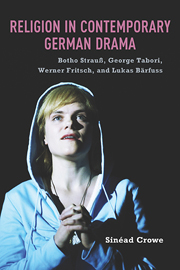 Religion in Contemporary German Drama
Religion in Contemporary German Drama Book contents
- Frontmatter
- Contents
- Acknowledgments
- Introduction: Definitions and Themes
- 1 The Relationship between Theater and Religion
- 2 Religion in Modern European Theater and Drama
- 3 “No One Wants to Get to God Anymore”? Botho Strauß's Groß und klein and Die eine und die andere
- 4 Theological Farce: George Tabori's Mein Kampf
- 5 “The Last Refuge for Metaphysics”: Werner Fritsch's Theater Theory
- 6 “The Feeling of Faith”: Fritsch's Wondreber Totentanz and Aller Seelen
- 7 Belief and Unbelief in the Twenty-First Century: Lukas Bärfuss's Der Bus (Das Zeug einer Heiligen)
- Conclusion
- Bibliography
- Index
4 - Theological Farce: George Tabori's Mein Kampf
Published online by Cambridge University Press: 05 May 2013
- Frontmatter
- Contents
- Acknowledgments
- Introduction: Definitions and Themes
- 1 The Relationship between Theater and Religion
- 2 Religion in Modern European Theater and Drama
- 3 “No One Wants to Get to God Anymore”? Botho Strauß's Groß und klein and Die eine und die andere
- 4 Theological Farce: George Tabori's Mein Kampf
- 5 “The Last Refuge for Metaphysics”: Werner Fritsch's Theater Theory
- 6 “The Feeling of Faith”: Fritsch's Wondreber Totentanz and Aller Seelen
- 7 Belief and Unbelief in the Twenty-First Century: Lukas Bärfuss's Der Bus (Das Zeug einer Heiligen)
- Conclusion
- Bibliography
- Index
Summary
SINCE FIRST COMING TO PROMINENCE in Germany with Die Kannibalen (The cannibals, 1969), a comedy depicting cannibalism among prisoners at Auschwitz, George Tabori has been best known as a taboo-exploding “memory worker” who uses black humor to confront audiences with the atrocities committed during the Nazi regime. Scholarship has been so preoccupied with assessing Tabori's contribution to the “Theater of the Holocaust” that the important role played by religion in his work has been greatly neglected. This chapter seeks to redress the imbalance somewhat by exploring the place of religion in Tabori's most successful play, Mein Kampf: Farce (1987), taking sidelong glances at some of his other theatrical texts for comparison's sake.
Mein Kampf exemplifies the darkly comic treatment of historical horrors that is Tabori's trademark, and it also contains the extensive religious allusions that are another distinctive feature of Tabori's writing for the theater. Tabori himself called Mein Kampf “ein theologischer Schwank” (a theological farce), but religious borrowings serve a variety of ends in this play, not all of which have a great deal to do with theology or indeed any of the other dimensions of religion. Thus whereas Botho Strauß's use of religious signs generally reflects a thematic interest in the place of religion in contemporary German culture and society, a rough distinction is drawn in this chapter between those moments where religious signs perform functions that are not specifically religious — such as exploring Jewish identity, problematizing the relationship between Jew and Gentile, or evoking the depravity of the Third Reich — and instances where the play examines the meaningfulness and relevance of religion itself.
- Type
- Chapter
- Information
- Religion in Contemporary German DramaBotho Strauß, George Tabori, Werner Fritsch, and Lukas Bärfuss, pp. 67 - 90Publisher: Boydell & BrewerPrint publication year: 2013
